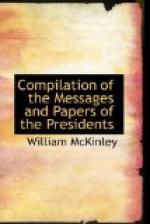Spanish rule must be replaced by a just, benevolent, and humane government, created by the people of Cuba, capable of performing all international obligations, and which shall encourage thrift, industry, and prosperity and promote peace and good will among all of the inhabitants, whatever may have been their relations in the past. Neither revenge nor passion should have a place in the new government. Until there is complete tranquillity in the island and a stable government inaugurated military occupation will be continued.
With the one exception of the rupture with Spain, the intercourse of the United States with the great family of nations has been marked with cordiality, and the close of the eventful year finds most of the issues that necessarily arise in the complex relations of sovereign states adjusted or presenting no serious obstacle to a just and honorable solution by amicable agreement.
A long unsettled dispute as to the extended boundary between the Argentine Republic and Chile, stretching along the Andean crests from the southern border of the Atacama Desert to Magellan Straits, nearly a third of the length of the South American continent, assumed an acute stage in the early part of the year, and afforded to this Government occasion to express the hope that the resort to arbitration, already contemplated by existing conventions between the parties, might prevail despite the grave difficulties arising in its application. I am happy to say that arrangements to this end have been perfected, the questions of fact upon which the respective commissioners were unable to agree being in course of reference to Her Britannic Majesty for determination. A residual difference touching the northern boundary line across the Atacama Desert, for which existing treaties provided no adequate adjustment, bids fair to be settled in like manner by a joint commission, upon which the United States minister at Buenos Ayres has been invited to serve as umpire in the last resort.
I have found occasion to approach the Argentine Government with a view to removing differences of rate charges imposed upon the cables of an American corporation in the transmission between Buenos Ayres and the cities of Uruguay and Brazil of through messages passing from and to the United States. Although the matter is complicated by exclusive concessions by Uruguay and Brazil to foreign companies, there is strong hope that a good understanding will be reached and that the important channels of commercial communication between the United States and the Atlantic cities of South America may be freed from an almost prohibitory discrimination.




